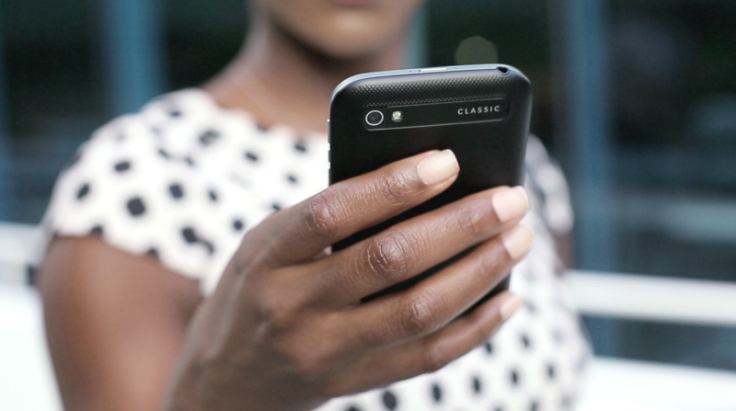BlackBerry Brings Back The Keyboard To Cater To Nostalgic Users, But Are There Any Left?

Is this a blast from the past, or is BlackBerry taking us back to the future? The BlackBerry Classic, announced Wednesday in New York City, looks strikingly similar to the primitive smartphones that were the prime technology back in the early 2000s. But BlackBerry, which has receded from its former glory, believes its latest smartphone will convert many users who miss the physical keyboard experience.
While the masses became obsessed with Apple iPhones and Samsung Galaxies, BlackBerry continued catering to its business enterprise users, and the company has seemingly maintained a near cult-like following of people who continue to choose its devices first, particularly for their security features but also for their physical design elements such as keyboards and trackpads. Until late this year, it had been over three years since BlackBerry launched a device with a physical keyboard -- that was the BlackBerry Bold 9900, in August 2011, which many die-hard fans still use today.
President Barack Obama, former first lady and Secretary of State Hillary Clinton, TV personality Kim Kardashian, actor Tim Allen and rapper Drake have all either been seen with BlackBerry handsets or have publicly expressed their love for their BlackBerrys. Kardashian in particular called her BlackBerry her “heart and soul,” telling Recode’s Kara Swisher in October that she wanted to buy the company in order to save it. Though BlackBerry CEO and Executive Chairman John Chen said in November that the company had no plans to pay celebrities to endorse its products, he thanked BlackBerry’s notable loyal fans for their free publicity at the BlackBerry Classic launch event at Cipriani Wall Street in New York City on Wednesday.
But BlackBerry realizes it will be a long, uphill battle to recapture significant market share. The company reported having sold 2.4 million smartphones during its second quarter of fiscal 2015, which ended in September, less than half the amount of smartphones it sold in the year-prior quarter. The company directly attributes its drop in sales to consumers leaving the platform. BlackBerry will report its third-quarter results for fiscal 2015 Friday, which should include its most recent sales figures.
BlackBerry anticipates a positive response to the Classic, and rumors have propelled the fervor. Tech blog CrackBerry reported last Friday that the BlackBerry Classic sold out for a time prior to its launch. While BlackBerry did not confirm the reports, Jeff Gadway, director of product marketing, said that demand for the Classic is strong. Those who preordered the Classic before launch should be receiving their devices within the next week. While shipping dates for those now ordering could extend into 2015.
The BlackBerry Classic is also attractively priced at $449 in the U.S., which should be brought down by carrier subsidies. In comparison, top devices such as the iPhone 6 start at $649, while the Galaxy Note 4 starts at $749.76. Reinventing its once most popular products is in step with BlackBerry’s primary aim: regaining customers. “I’m not going to sit here blind to the fact that we’ve lost some of you, but I’m confident that we're going to win you back,” Gadway said.
The Classic now accompanies another new device in BlackBerry’s portfolio, the BlackBerry Passport, the box-shaped, premium, modern take on the old BlackBerrys, which competes with the latest iPhones and Samsung Galaxy devices in terms of price. Its original price is $699. But the Classic in particular was designed based on feedback from longtime BlackBerry fans. Chen noted that while talking to some of BlackBerry’s most diligent users, some companies' CEOs would take out their BlackBerry Bold 9900 handsets and say, “Don’t mess around with this; don’t mess around with the keyboard; don’t mess around with the trackpad.”
“Classic is aiming for loyal customers, this is true, [but] we’re inviting a lot of people who haven’t used the Classic, especially the young people, to try it out for themselves,” Chen said.
© Copyright IBTimes 2024. All rights reserved.












